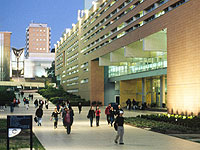 |
|
 |
| |
| |
| |
| |
| |
Contact: Svenson,Charles John
| |
| |
Campus: Kensington Campus
| |
| |
Career: Undergraduate
| |
| |
Units of Credit: 6
| |
| |
| |
| |
Contact Hours per Week: 6
| |
| |
Enrolment Requirements:
| |
| |
Prerequisite: BIOC2101, BIOC2201; Excluded: BIOT3011
| |
| |
| |
| |
| |
 |
|
 |
Description
This course is available to Advance Science students or as an advanced option to students in other appropriate science programs. The advanced course differs to Biotechnology A (BIOT3011) by providing greater opportunities for self-directed learning, separate laboratory practicals, and for research planning under the guidance of mentors from the academic or research staff. The lecture component of the course differs from that in BIOT3011 in the number and content of lecture and laboratory exams.
The goal of the course is to build on the fundamentals acquired in previous courses and develop an understanding of the commercial applications of biological systems. The course will consider the principles involved in microbial processes for chemical, pharmaceutical and food production on a commercial scale. The lecture component will address the nature of the genetic tools used to optimise product formation; the influence of environmental factors on microbial productivity; biodiversity issues; bioprocesses; the nature of industrially important cell types from prokaryotic to higher eukaryotic cells; and the commercial and marketing issues inherent in biotechnological processes. Lectures are supplemented by industrial presentations. The laboratory component includes manipulation of industrially important microorganisms. The development of team skills in a critical review of current research areas is a feature of the course. The course is intended for students interested in the commercial and multidiscplinary perspectives of processes using microbial and other cell types.
|

